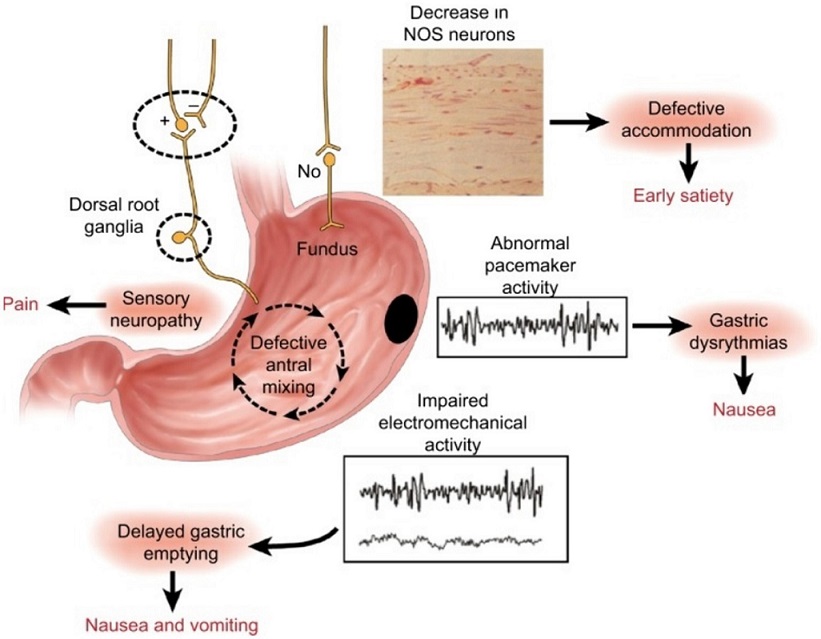Erythromycin - A key solution for managing Gastroparesis in critically ill patients
Sebastian Lavoie Fact checked by:Thailand Medical News Team Sep 11, 2024 1 year, 5 months, 11 hours, 27 minutes ago
Medical News: Gastroparesis, a condition that affects the stomach's ability to empty food properly, is a challenging disorder, especially for critically ill patients in intensive care units (ICUs). This condition can cause a build-up of food in the stomach without any apparent physical obstruction. Symptoms such as nausea, vomiting, bloating, and early satiety are common among patients suffering from this disorder. In critically ill patients, gastroparesis often leads to intolerance of enteral feeding, which is essential for providing nutrition. The consequences are severe, including malnutrition and an increased risk of infection.
 Summary of the neural, myoelectrical, muscular, and cellular aspects of the pathophysiology of gastroparesis.
Summary of the neural, myoelectrical, muscular, and cellular aspects of the pathophysiology of gastroparesis.
A study conducted by the Department of Anesthesiology and Intensive Care at Copernicus Hospital in Gdansk, Poland, in collaboration with other medical institutions in Poland, focused on the use of erythromycin as a prokinetic agent to manage gastroparesis. This
Medical News report highlights the key findings of that study and provides insights into the management of gastroparesis in ICU patients.
Understanding Gastroparesis in Critical Care
Gastroparesis is especially prevalent among ICU patients due to the disruption of normal gastrointestinal motility. Critically ill patients are at high risk for developing gastroparesis because of various factors, such as hyperglycemia, medications that slow down gastrointestinal peristalsis, and conditions like sepsis that impair gastrointestinal function.
According to research, around 30-60% of ICU patients experience some form of gastrointestinal dysfunction, making gastroparesis a common issue in critical care settings. When the stomach is unable to empty properly, it leads to regurgitation, aspiration of stomach contents into the respiratory tract, and the colonization of the gastrointestinal tract with harmful bacteria. These complications can further exacerbate the patient’s condition and lead to prolonged ICU stays.
The Role of Erythromycin as a Prokinetic Agent
Erythromycin is an antibiotic that belongs to the macrolide class, widely recognized for its antimicrobial properties. However, this drug also has motilin-like effects that stimulate gastrointestinal motility, making it an effective prokinetic agent for treating gastroparesis. The use of erythromycin in critically ill patients has shown promising results, helping to improve gastric emptying and alleviate the symptoms of gastroparesis.
The study conducted by Copernicus Hospital researchers explored erythromycin's effectiveness in managing gastroparesis in critically ill patients. Their findings revealed that the drug could significantly enhance gastrointestinal motility, enabling faster gastric emptying and a quicker return to enteral feeding.
Study Methodology and Key Findings
The researchers reviewed scientific literature to understand the potential benefits and risks associated with erythromycin in gastr
oparesis treatment. In their experience, erythromycin was used alongside other prokinetic drugs like metoclopramide and itopride hydrochloride to achieve synergistic effects. The treatment showed considerable success in accelerating gastric emptying in patients who had difficulty tolerating enteral feeding.
One of the study’s critical findings was that erythromycin, when administered intravenously, quickly restored gastric motility. In 23 ICU patients diagnosed with severe gastroparesis, erythromycin treatment led to an improvement in symptoms by the second day of therapy. This rapid response allowed these patients to resume enteral feeding, a crucial aspect of their recovery.
The use of erythromycin in combination with metoclopramide and itopride was particularly effective in achieving a quicker return to enteral feeding. The combination therapy not only improved gastric emptying but also minimized the risk of complications associated with prolonged gastroparesis.
Erythromycin’s Mechanism of Action
Erythromycin works by binding to motilin receptors in the gastrointestinal tract, stimulating coordinated contractions of the stomach muscles, and enhancing gastric motility. The drug’s effects are dose-dependent, with lower doses primarily targeting the stomach and esophagus, while higher doses also impact the small intestine.
In the study, erythromycin was administered at a dose of 300 mg three times a day through intravenous infusion. Most patients experienced significant improvement within a few days, and the symptoms of gastroparesis were largely resolved. For the majority of these patients, this treatment led to a rapid return of gastrointestinal function and an early shift from parenteral nutrition to enteral feeding.
Potential Risks and Side Effects
While erythromycin proved effective in managing gastroparesis, it is important to note the potential risks associated with its use. Erythromycin, being an antibiotic, can cause side effects such as diarrhea, nausea, and abdominal cramps. However, in this study, none of the patients experienced severe side effects, and there were no reported cases of Clostridium difficile infection, a common complication associated with broad-spectrum antibiotic use.
The researchers emphasized that although erythromycin carries the risk of bacterial resistance and QT prolongation (a heart rhythm disorder), its prokinetic benefits outweigh these risks when used appropriately in critically ill patients. Additionally, the drug’s short-term use as a prokinetic agent minimizes the chances of developing antibiotic resistance.
Conclusion and Future Directions
This study confirms that erythromycin is a valuable prokinetic drug for managing gastroparesis in critically ill patients. Its ability to stimulate gastric emptying and enhance gastrointestinal motility makes it a crucial tool in the ICU, where rapid return to enteral feeding is essential for patient recovery. The combination of erythromycin with other prokinetic drugs, such as metoclopramide and itopride, further enhances its effectiveness.
Future research should focus on optimizing the dosing regimen of erythromycin to minimize side effects while maintaining its prokinetic benefits. Additionally, studies could explore the long-term effects of erythromycin use in ICU patients and evaluate its potential for broader applications in gastrointestinal motility disorders.
The study findings were published in the peer-reviewed journal: Frontiers in Medicine.
https://www.frontiersin.org/journals/medicine/articles/10.3389/fmed.2024.1440992/full
For the latest on Gastroparesis, keep on logging to Thailand
Medical News.
Read Also:
https://www.thailandmedical.news/news/breaking-covid-19-news-cleveland-clinic-study-finds-that-sars-cov-2-infections-can-lead-to-new-onset-gastroparesis-in-many
https://www.thailandmedical.news/news/pharma-news-lawsuit-alleges-ozempic-and-mounjaro-diabetes-weigh-loss-drugs-cause-severe-stomach-problems-including-gastroparesis-or-stomach-paralysis
